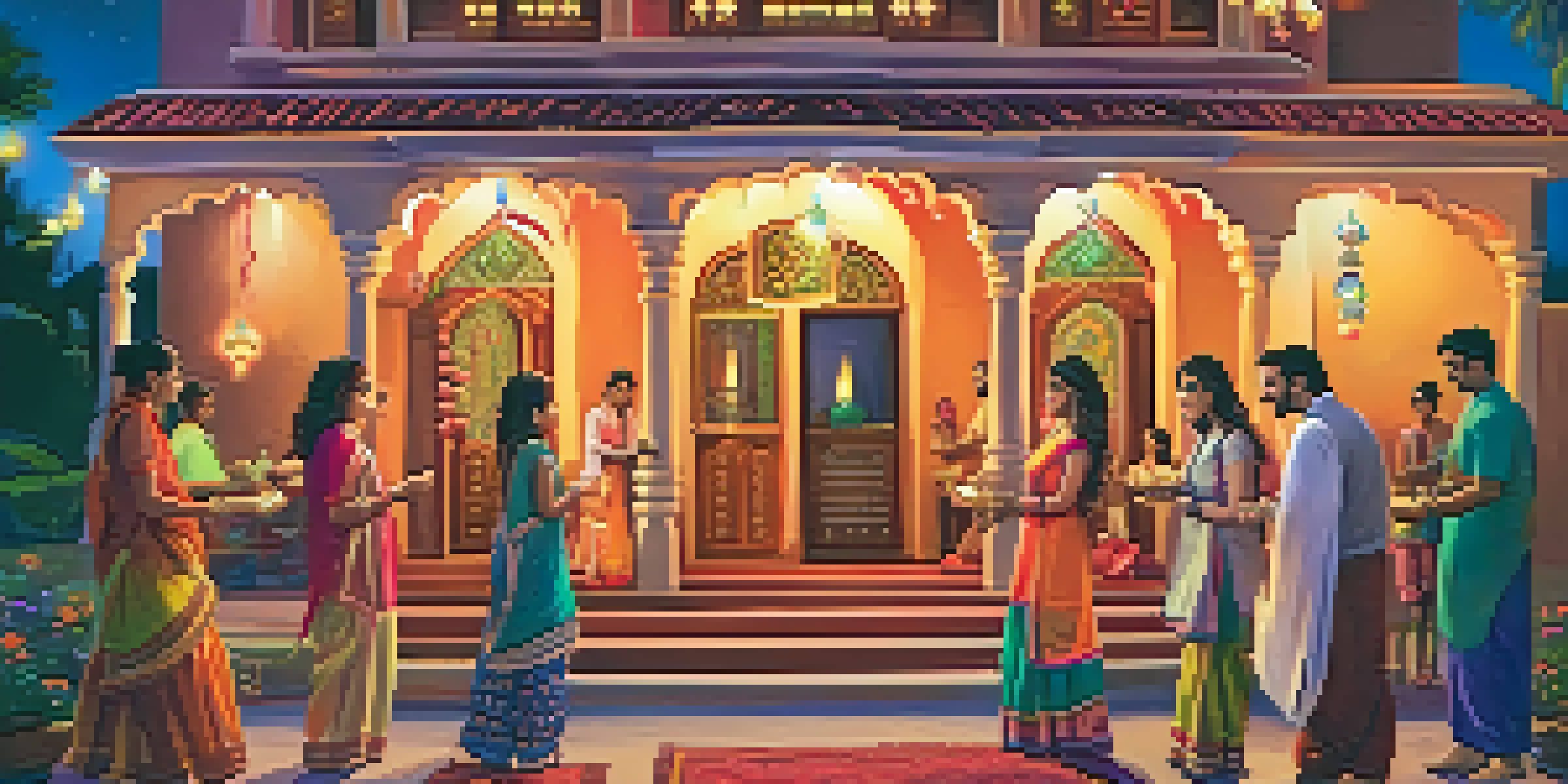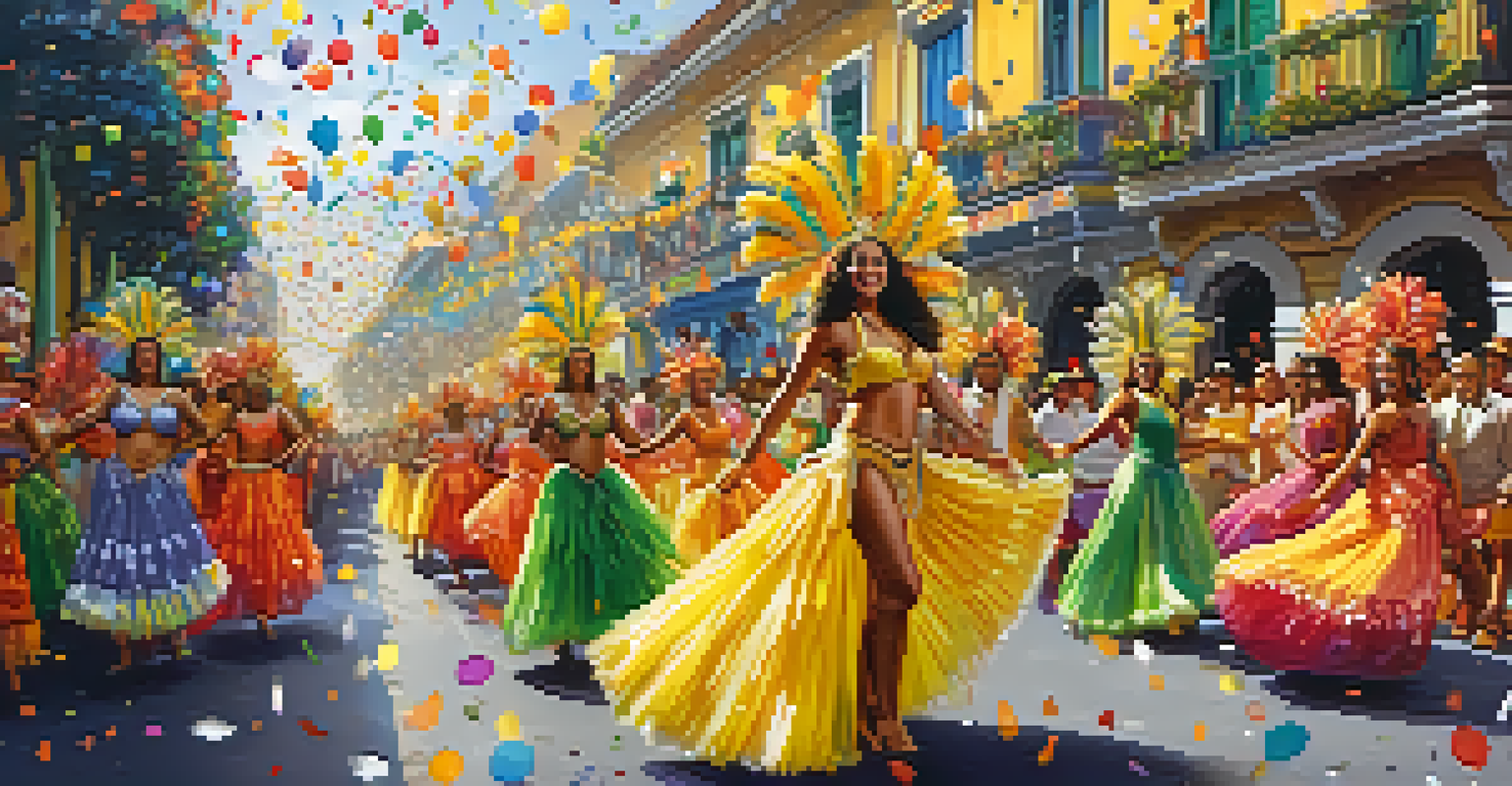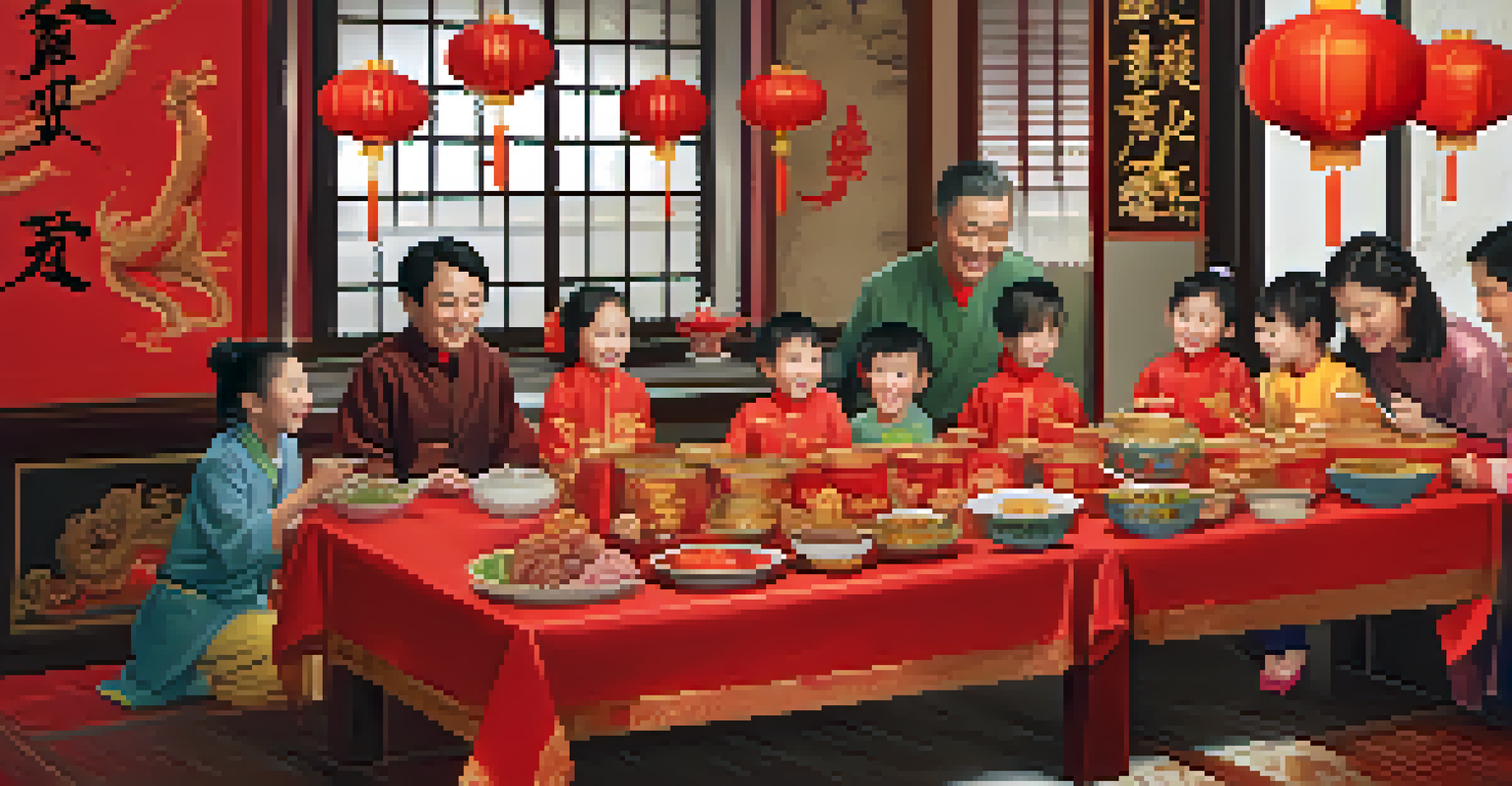Celebrating Diversity: Festivals That Highlight Global Cultures

Diwali: The Festival of Lights Celebrating Hindu Culture
Diwali, known as the Festival of Lights, is a vibrant Hindu celebration that marks the victory of light over darkness. This five-day festival is characterized by the lighting of oil lamps, vibrant decorations, and joyous gatherings with family and friends. It’s a time when communities come together to celebrate love, forgiveness, and new beginnings, showcasing the rich tapestry of Hindu traditions.
Festivals are a time for people to come together and celebrate what makes us human.
During Diwali, homes are adorned with rangoli designs made from colored powders and flowers, creating a warm and inviting atmosphere. Fireworks light up the night sky, adding to the festive spirit. The festival also emphasizes giving, as people exchange sweets and gifts, reinforcing the bonds of community and friendship.
Beyond the beautiful lights and decorations, Diwali teaches values of kindness and generosity. It’s a reminder that no matter our backgrounds, we can all come together to celebrate the universal themes of hope and renewal.
Carnival: A Colorful Celebration of Brazilian Culture
Carnival in Brazil is a spectacular explosion of color, music, and dance, attracting millions from around the world. This annual festival, held before Lent, is famous for its lively samba parades and vibrant street parties that embody the spirit of Brazilian culture. It’s a time when everyone, regardless of background, joins in the celebration, creating an atmosphere of unity and joy.

The heart of Carnival lies in the samba schools, which spend months preparing elaborate floats and costumes for the parade. These performances are not just about entertainment; they tell stories of Brazil’s diverse heritage and social issues, fostering a sense of pride among participants. The rhythmic beats of samba music echo through the streets, inviting everyone to dance and celebrate.
Festivals Unite Diverse Cultures
Cultural festivals like Diwali, Carnival, and Holi emphasize the importance of community and togetherness, celebrating shared values across different backgrounds.
Carnival is more than just a party; it’s a deep-rooted tradition that showcases Brazil's cultural diversity. It highlights how music and dance can break barriers and bring people together, reminding us that celebration is a universal language.
Lunar New Year: A Joyous Celebration of Asian Cultures
Lunar New Year, celebrated by millions across Asia, marks the arrival of spring and the start of a new lunar calendar year. This vibrant festival includes various customs, such as family reunions, feasting, and giving red envelopes filled with money for good luck. Each culture has its unique traditions, yet all share the common theme of renewal and hope.
In every culture, there is a celebration that brings people together; it is a universal language of joy.
During the Lunar New Year, homes are often cleaned and decorated with red symbols, which signify luck and prosperity. Families gather to enjoy traditional dishes, each representing good fortune, such as dumplings and fish. Parades featuring dragon dances and fireworks also take place, symbolizing the driving away of evil spirits and welcoming in good fortune.
This celebration fosters a strong sense of community and familial bonds. It’s a reminder of the importance of heritage and the joy found in togetherness, highlighting how cultural festivals can unite diverse groups in shared celebration.
Oktoberfest: A Celebration of German Beer and Culture
Oktoberfest, held annually in Munich, Germany, is the world’s largest beer festival, attracting millions of visitors each year. This 16- to 18-day festival is not just about beer; it’s a celebration of Bavarian culture, featuring traditional music, food, and folk dances. The lively atmosphere brings together people from all walks of life, creating a sense of camaraderie and joy.
Visitors can enjoy a variety of delicious German foods, such as pretzels, sausages, and roasted meats, all while sipping on refreshing local beers. Each beer tent offers a unique experience, with live music and cheerful crowds, making it a perfect setting to socialize and celebrate. The festival also includes parades showcasing traditional costumes, further immersing guests in Bavarian culture.
Joyful Traditions Foster Connections
Festivals such as Oktoberfest and Mardi Gras showcase how food, music, and dance create a sense of belonging and pride in cultural heritage.
Oktoberfest embodies the spirit of celebration and community, emphasizing how food and drink can bring people together. It’s a beautiful example of how traditions can promote cultural exchange and understanding in a fun and engaging way.
Holi: The Festival of Colors and Love in India
Holi, the Festival of Colors, is a joyous celebration in India that marks the arrival of spring and the triumph of good over evil. During this vibrant festival, people throw colored powders and water at each other, creating a kaleidoscope of hues. It’s a time of forgiveness, renewal, and celebration of love, making it one of the most beloved festivals in Indian culture.
The festivities usually begin with a bonfire, symbolizing the burning of negativity and the ushering in of positivity. As the day unfolds, laughter fills the air as friends and families come together to celebrate, dance, and enjoy traditional sweets. Holi transcends barriers of age, caste, and gender, inviting everyone to join in the fun and express their joy.
Holi is not just a festival; it’s a reminder of the power of love and unity. It teaches us that despite our differences, we can come together to celebrate the beauty of life, making it a truly universal celebration.
Mardi Gras: A Festive Tribute to New Orleans Culture
Mardi Gras, celebrated primarily in New Orleans, is a lively festival known for its extravagant parades, vibrant costumes, and delicious cuisine. This pre-Lenten celebration embodies the spirit of the city, showcasing the rich blend of French, African, and Spanish influences that define New Orleans culture. It’s a time of revelry, where music and dance fill the streets.
The iconic parades feature colorful floats, marching bands, and the famous tossing of beads and trinkets to eager crowds. This sense of community and shared excitement creates a festive atmosphere that brings people together, highlighting the importance of cultural expression. Traditional foods like king cake add a delicious twist to the celebrations, making every bite a part of the experience.
Celebration as a Universal Language
Events like La Tomatina highlight how joyous, playful activities can break down barriers, fostering friendships and unforgettable experiences among participants.
Mardi Gras represents the joy of living and the importance of celebration in the face of life’s challenges. It serves as a reminder of how festivals can foster a sense of belonging and pride in one’s cultural heritage.
La Tomatina: A Unique Celebration of Community in Spain
La Tomatina, held annually in Buñol, Spain, is a quirky festival where participants engage in a massive tomato fight, resulting in a sea of red pulp. This unique celebration began in 1945 and has since grown into a global phenomenon, drawing thousands of people eager to partake in the fun. It’s a lighthearted event that emphasizes the joy of community and shared experiences.
During the festival, participants throw ripe tomatoes at each other, creating a lively and messy atmosphere. The laughter and camaraderie are palpable as locals and tourists alike come together to enjoy the chaos. After the fight, the town comes together for music, dancing, and delicious paella, further fostering a sense of unity.

La Tomatina exemplifies how festivals can break down barriers and create unforgettable memories. It’s a reminder that sometimes, celebrating diversity means embracing the unexpected and finding joy in the simplest of activities.